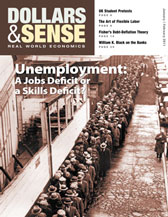This article is from Dollars & Sense: Real World Economics, available at http://www.dollarsandsense.org

This article is from the January/February 2011 issue of Dollars & Sense magazine.
Subscribe Now
at a 30% discount.

Dear Dr. Dollar:
Why are conservatives, especially wealthy conservatives, against stimulating the economy through the governmentís deficit spending? Donít businessesí profits and the incomes of the wealthy depend on economic growth?
—Andy Druding, Richmond, Calif.
As it turns out, business profits are already doing pretty well in spite of—or perhaps because of—the poor economic conditions for most people. Corporate profits have been expanding at a good clip since the beginning of 2009. In the third quarter of 2010, profits of domestic corporations were running at an annual rate of $1.27 trillion—not back up to their peak of $1.40 trillion four years earlier, but well on the way to that high mark. Even after an adjustment for inflation, current profits are in relatively good shape.
So it is not too hard to see why the people whose incomes are tied to profits are not eager to see a dramatic shift of policy. Still, you might think that more economic growth would provide even more profits.
Profits, however, depend on two things: the amount of value that gets created (output) and the share of that value that goes to profits. With a high level of unemployment, workers are in a poor position to demand higher wages—i.e., a larger share of that value. So businesses, and the wealthy who get their income from owning businesses, do not want unemployment to fall too low—low enough to give workers more bargaining power.
The weak position of workers in the current economic situation affects more than wages. While a recession lasts, businesses are able to implement changes more readily than in “normal” times. For example, they can change work rules, get rid of older workers, and bring in new technology more easily, as workers are in a poorer position to resist change. Also, the “shock” imposed on society by bad economic conditions can be used in the political sphere, making it possible for businesses and the wealthy to obtain concessions from government—the tax incentives state governments offer, for example, in the hope of generating some local growth. (However, an economic crisis also opens up possibilities for changes in the other direction. Consider, for example, the progressive changes in the United States that came out of the Great Depression of the 1930s.)
From the perspective of the wealthy, then, perhaps a bit more growth would be better, but not so much as to weaken their positions. Most important, if that growth required the government to spend a lot more by running deficits, the wealthy are not interested. They fear that high deficits now mean more taxes down the line. In part, higher taxes could be needed to pay off the debt the government would incur when it ran those deficits. Perhaps more important, upping government spending today threatens to entrench a long-run higher level of government activity, which would require higher taxes on a permanent basis. The wealthy might be able to push the tax obligations onto lower income groups. Yet, with income inequality as great as it is, itís hard to get much more out of anyone but the wealthy. You canít get blood from a stone.
These concerns about higher taxes generate a strong anti-big-government ideology, and the ideology can trump common sense. There are plenty of people who because they oppose “big government” oppose the spending that would be involved in any program that would provide significant economic stimulus through deficit spending. Of course not all of these people are among the wealthy, but they share the anti-government, anti-tax ideology. After all, they cannot improve their incomes by voting for higher wages, but they can—or think they can—improve their incomes by voting against taxes, which means voting against “big government,” which means voting against deficits.
All this said, most of todayís large federal budget deficit is not the result of spending designed to stimulate the economy. In fiscal year 2009, the budget deficit was about $1.4 trillion. Yet the February 2009 “stimulus package” accounted for a small share of that deficit. In 2001, the Congressional Budget Office (CBO) estimated the government was on course for a 2009 surplus of $700 billion. Why this $2.1 trillion difference between the CBO estimate and reality?
Slow economic growth in the early 2000s followed by severe downturn in 2008 and 2009 accounted for over 40% of the difference, as tax income declined sharply and some spending automatically increased (e.g., unemployment compensation). About 50% of the difference resulted from legislation enacted in the Bush years—over half of which was war spending, tax breaks for the wealthy, and the bank bailout. The stimulus package of the Obama administration accounted for only about 8% of the difference, a pretty small share.
Businesses and the wealthy who rail against the deficit do have real interests that they are protecting. But they are also using the deficit issue to attack the Obama administrationís stimulus efforts, which turn out not to have been all that big.
Did you find this article useful? Please consider supporting our work by donating or subscribing.
Did you find this article useful? Please consider supporting our work by donating or subscribing.
